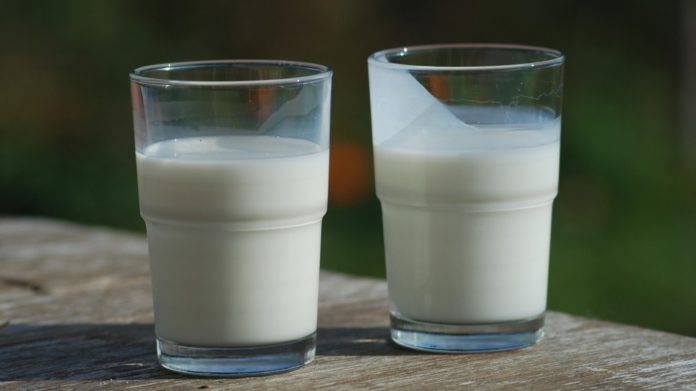Drinking milk could be bad for women, new study finds

Drinking three or more glasses of milk per day may be harmful to women’s health, a new study suggests.
Women in the study who downed at least three glasses of milk a day were nearly twice as likely to die over the next 20 years compared with their peers who drank less than a glass daily, researchers in Sweden found. In addition, the study found that women’s risk of bone fracture climbed steadily as their milk intake increased.
The culprit could be galactose, a simple sugar found in milk, said Karl Michaelsson, a professor at Uppsala University in Sweden and one of the study’s authors. “That compound might induce oxidative stress and low-grade inflammation, and that type of inflammation can affect mortality and fractures,” Michaelsson told Live Science. “The funny thing is that if you provide galactose to experimental animals, they will die faster by induction of oxidative stress and inflammation.”
The U.S. Department of Agriculture recommends that adults get the equivalent of 3 cups of milk daily, based on the idea that dairy is good for the bones, and may reduce heart disease risk. But there’s actually little scientific evidence to support these recommendations, the study authors said.
Given the harmful effects of galactose in animals, Michaelsson and his team hypothesized that higher milk consumption in humans would be associated with more oxidative stress and, therefore, a greater risk of fractures and mortality over a period of time.
Their study included 61,433 women who were ages 39 to 74 at the study’s start, and 45,339 men ages 45 to 79. All of the study participants reported on their diet at the beginning of the study period.
The women were followed for 20 years, on average. During that time, 15,541 died and 17,252 had fractures, including 4,259 hip fractures. After the researchers took into account factors like age, body mass index and alcohol consumption, they found that women who drank three or more glasses of milk daily were 1.93 times more likely to die during the follow-up period than those who drank less than a glass of milk daily.
The risk of death during the 20-year period rose by 15% with each daily glass of milk consumed, the researchers also found.
Perhaps unexpectedly, higher milk consumption was linked with an increased likelihood of fractures, including hip fractures, the researchers found. Although it’s not clear what mechanism may underlie this possible link, it could be that a greater intake of galactose increases the levels of oxidative stress and inflammation in the body, making fractures more likely, according to the researchers.
Among the men, who were followed for an average of about 11 years, there was no association between mortality or fractures and milk consumption, according to the findings, which are published Tuesday in the journal The BMJ.
But dairy lovers need not despair. The researchers found that fermented milk products, like cheese and yogurt — which contain little or no galactose — had the opposite effect: Women who ate or drank the most fermented milk products were less likely to die or sustain fractures during the study. Women’s mortality and hip-fracture risk declined by 10 to 15% with each daily serving, the study found.
The researchers also looked at markers of oxidative stress and inflammation in a subset of study participants. Both men and women who drank more milk had higher levels of a compound called 8-iso-PGF2a, which is a marker of oxidative stress in the body found in urine.
Milk consumption was also positively associated with levels of interleukin 6, a marker of inflammation, in men, but not in women. However, a higher intake of fermented milk products (aside from cheese) was linked with lower levels of these markers.
People shouldn’t change their dietary habits based on the findings of a single study, Michaelsson said. But he admitted he quit drinking milk two years ago, and opts for yogurt instead. “I’ve been involved in this research area for several decades now,” he said. “This last study really convinced me.”
In future research, Michaelsson said, he and his colleagues would like to see if the effect of milk on mortality is modified by antioxidant intake.
In an editorial accompanying the new study in the journal, C. Mary Schooling, a professor at the City University of New York School of Public Health at Hunter College, wrote that the findings “raise a fascinating possibility about the potential harms of milk, with an interesting inner mechanism” involving galactose.
The idea that galactose may be involved is consistent with evidence from other studies, wrote Schooling, who was not involved in the new research.
However, she noted that the new findings “should be interpreted cautiously, though, because the authors rely on observational — not experimental — evidence, potentially reflecting correlation, not causation.”
- Watching Pig Bodies Decomposing at Sea, for Science! | Video
- CDC Issues New Guidelines for Travelers from Ebola-Outbreak Countries
- ‘Smart’ Robot Could Help Rescue Disaster Victims
- Do DIY Teeth Whitening Methods Really Work?
This article originally published at LiveScience here

